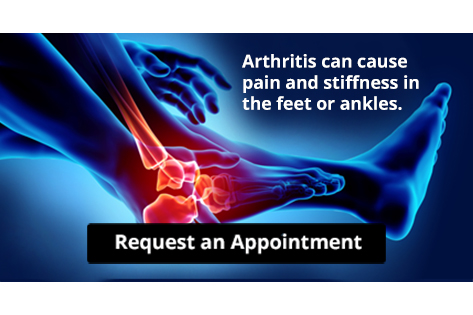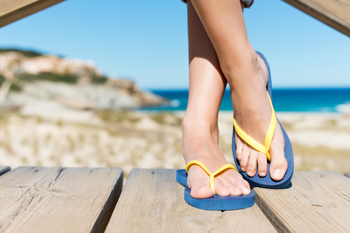 The nerve that becomes thick or irritated in patients that have Morton’s neuroma is referred to as the plantar interdigital nerve. This condition can produce severe pain and discomfort, and generally occurs between the second, third, or fourth toes. It can develop as a result of wearing shoes that do not have adequate room for the toes to move freely in, or from repetitive impact that can come from participating in running and jumping activities. Common symptoms that many patients experience can include a burning pain in the forefoot, and many people often describe the feeling as having a small stone that is lodged under the foot. If you are afflicted with Morton’s neuroma, please confer with a podiatrist as quickly as possible who can effectively treat this condition.
The nerve that becomes thick or irritated in patients that have Morton’s neuroma is referred to as the plantar interdigital nerve. This condition can produce severe pain and discomfort, and generally occurs between the second, third, or fourth toes. It can develop as a result of wearing shoes that do not have adequate room for the toes to move freely in, or from repetitive impact that can come from participating in running and jumping activities. Common symptoms that many patients experience can include a burning pain in the forefoot, and many people often describe the feeling as having a small stone that is lodged under the foot. If you are afflicted with Morton’s neuroma, please confer with a podiatrist as quickly as possible who can effectively treat this condition.
Morton’s neuroma is a very uncomfortable condition to live with. If you think you have Morton’s neuroma, contact Dr. Alexander Terris of Total Foot Care. Our doctor will attend to all of your foot care needs and answer any of your related questions.
Morton’s Neuroma
Morton's neuroma is a painful foot condition that commonly affects the areas between the second and third or third and fourth toe, although other areas of the foot are also susceptible. Morton’s neuroma is caused by an inflamed nerve in the foot that is being squeezed and aggravated by surrounding bones.
What Increases the Chances of Having Morton’s Neuroma?
Morton’s neuroma is a very treatable condition. Orthotics and shoe inserts can often be used to alleviate the pain on the forefront of the feet. In more severe cases, corticosteroids can also be prescribed. In order to figure out the best treatment for your neuroma, it’s recommended to seek the care of a podiatrist who can diagnose your condition and provide different treatment options.
If you have any questions, please feel free to contact our office located in Wilmington, DE . We offer the newest diagnostic and treatment technologies for all your foot care needs.
Read more about Morton's Neuroma
If you are suffering from tenderness, pain, or stiffness in the joints of your feet or ankles, call us to schedule an appointment.
 Swollen feet is a common symptom that many women experience during pregnancy. This can be a result of increased hormone levels as well as increased levels of fluids in the body. Additionally, the blood becomes thicker in pregnant women and the blood volume is said to increase up to 50%. Swollen feet can typically be noticed during the second trimester, but really amps up in the third trimester as the body continues to raise blood and fluid levels to prepare for the baby's arrival. Relief may be found when caffeine intake is limited and the feet are frequently elevated. It can help to drink plenty of fresh water daily as well. Research has also indicated that swelling may be reduced when less sodium is ingested, and it may be beneficial to eat foods that have adequate levels of potassium. If you would like more information about how pregnancy affects the feet and different ways to alleviate the swelling, please confer with a podiatrist.
Swollen feet is a common symptom that many women experience during pregnancy. This can be a result of increased hormone levels as well as increased levels of fluids in the body. Additionally, the blood becomes thicker in pregnant women and the blood volume is said to increase up to 50%. Swollen feet can typically be noticed during the second trimester, but really amps up in the third trimester as the body continues to raise blood and fluid levels to prepare for the baby's arrival. Relief may be found when caffeine intake is limited and the feet are frequently elevated. It can help to drink plenty of fresh water daily as well. Research has also indicated that swelling may be reduced when less sodium is ingested, and it may be beneficial to eat foods that have adequate levels of potassium. If you would like more information about how pregnancy affects the feet and different ways to alleviate the swelling, please confer with a podiatrist.
Pregnant women with swollen feet can be treated with a variety of different methods that are readily available. For more information about other cures for swollen feet during pregnancy, consult with Dr. Alexander Terris from Total Foot Care. Our doctor will attend to all of your foot and ankle needs.
What Foot Problems Can Arise During Pregnancy?
One problem that can occur is overpronation, which occurs when the arch of the foot flattens and tends to roll inward. This can cause pain and discomfort in your heels while you’re walking or even just standing up, trying to support your baby.
Another problem is edema, or swelling in the extremities. This often affects the feet during pregnancy but tends to occur in the later stages.
How Can I Keep My Feet Healthy During Pregnancy?
If you have any questions please feel free to contact our office located in Wilmington, DE . We offer the newest diagnostic and treatment technologies for all your foot and ankle needs.
Read more about Foot Care for Pregnant Women The five metatarsal bones, plus the tendons and ligaments that create the arch at the top of the foot and connect the midfoot to the forefoot, are known as the Lisfranc joint complex. These ligaments and tendons can be sprained, or the metatarsal bones can be fractured, resulting in what is known as a “Lisfranc injury.” Usually this injury is caused by either trauma to the foot or a sudden force and rotation to the midfoot. If there are no fractures or complete tears, a cast will likely be needed for around six weeks before starting rehab. However, most Lisfranc injury cases will require a surgery that realigns the structures to ensure proper healing, and recovery time can take as long as six months. If you have experienced a Lisfranc injury or would like more information, make sure to consult with your podiatrist.
The five metatarsal bones, plus the tendons and ligaments that create the arch at the top of the foot and connect the midfoot to the forefoot, are known as the Lisfranc joint complex. These ligaments and tendons can be sprained, or the metatarsal bones can be fractured, resulting in what is known as a “Lisfranc injury.” Usually this injury is caused by either trauma to the foot or a sudden force and rotation to the midfoot. If there are no fractures or complete tears, a cast will likely be needed for around six weeks before starting rehab. However, most Lisfranc injury cases will require a surgery that realigns the structures to ensure proper healing, and recovery time can take as long as six months. If you have experienced a Lisfranc injury or would like more information, make sure to consult with your podiatrist.
Ankle and foot injuries are common among athletes and in many sports. They can be caused by several problems and may be potentially serious. If you are feeling pain or think you were injured in a sporting event or when exercising, consult with Dr. Alexander Terris from Total Foot Care. Our doctor will assess your condition and provide you with quality foot and ankle treatment.
Common Injuries
The most common injuries that occur in sporting activities include:
Symptoms
Symptoms vary depending upon the injury and in some cases, there may be no symptoms at all. However, in most cases, some form of symptom is experienced. Pain, aching, burning, bruising, tenderness, tightness or stiffness, sensation loss, difficulty moving, and swelling are the most common symptoms.
Treatment
Just as symptoms vary depending upon the injury, so do treatment options. A common treatment method is known as the RICE method. This method involves rest, applying ice, compression and elevating the afflicted foot or ankle. If the injury appears to be more serious, surgery might be required, such as arthroscopic or reconstructive surgery. Lastly, rehabilitation or therapy might be needed to gain full functionality in the afflicted area. Any discomfort experienced by an athlete must be evaluated by a licensed, reputable medical professional.
If you have any questions, please feel free to contact our office located in Wilmington, DE . We offer the newest diagnostic and treatment technologies for all your foot care needs.
Read more about Sports Related Foot and Ankle Injuries Flip-flops are popular summer footwear for their ease and comfort, but did you know that wearing flip-flops can be detrimental to your foot health? Because of their generally flimsy structure and lack of cushioning, wearing flip-flops can lead to a variety of foot problems. Plantar fasciitis, the inflammation of the tissue that runs along the bottom of the foot, can be caused by wearing flip-flops as they do not provide arch support. Tendinitis, inflammation or irritation of the tendons located on either side of your ankles, is another common condition that can be caused by flip-flops. Flip-flops create instability in your ankles when you walk, which makes an injury more likely. Metatarsalgia, pain in the bottom of the foot, can also be caused by wearing flip-flops, as these completely flat shoes do not cushion your feet from the pounding and pressure exerted on your joints as you walk. If you are experiencing foot problems, it is recommended that you seek the care of a podiatrist.
Flip-flops are popular summer footwear for their ease and comfort, but did you know that wearing flip-flops can be detrimental to your foot health? Because of their generally flimsy structure and lack of cushioning, wearing flip-flops can lead to a variety of foot problems. Plantar fasciitis, the inflammation of the tissue that runs along the bottom of the foot, can be caused by wearing flip-flops as they do not provide arch support. Tendinitis, inflammation or irritation of the tendons located on either side of your ankles, is another common condition that can be caused by flip-flops. Flip-flops create instability in your ankles when you walk, which makes an injury more likely. Metatarsalgia, pain in the bottom of the foot, can also be caused by wearing flip-flops, as these completely flat shoes do not cushion your feet from the pounding and pressure exerted on your joints as you walk. If you are experiencing foot problems, it is recommended that you seek the care of a podiatrist.
Flip-flops are not always the best choice of footwear. If you have any concerns about your feet or ankles, contact Dr. Alexander Terris from Total Foot Care. Our doctor will assist you with all of your foot and ankle needs.
Flip-Flops and Feet
When the weather starts warming up, people enjoy wearing flip-flops. Flip-flops are comfortable, stylish, and easy to slip on and off; they're perfect for any summer beach goer. However, these shoes can cause harm to the feet.
How Can Flip-Flops Affect Me Long-Term?
Are There Injuries Associated with Flip-Flops?
Yes. Since flip-flops are relatively weak and do not provide the same amount of support as sneakers, people who wear flip-flops regularly are more susceptible to injuries. On top of that, the open nature of the shoe makes your feet more prone to other problems, such as cuts and even infections. Common injuries and ailments include:
I like Wearing Flip-Flops. Are There Safe Alternatives?
When buying flip-flops, try to find ones that have sturdy soles and that are made of high-quality materials that will support for your feet. These flip-flops will cost more but will also last longer as a result.
If you have any questions please feel free to contact our office located in Wilmington, DE . We offer the newest diagnostic and treatment technologies for all your foot and ankle needs.
Read more about Flip Flops and Feet
Gout is a painful, inflammatory form of arthritis. Those affected will typically feel an intense stiffness in the joints of their feet, particularly in the big toe. Schedule a visit to learn about how gout can be managed and treated.